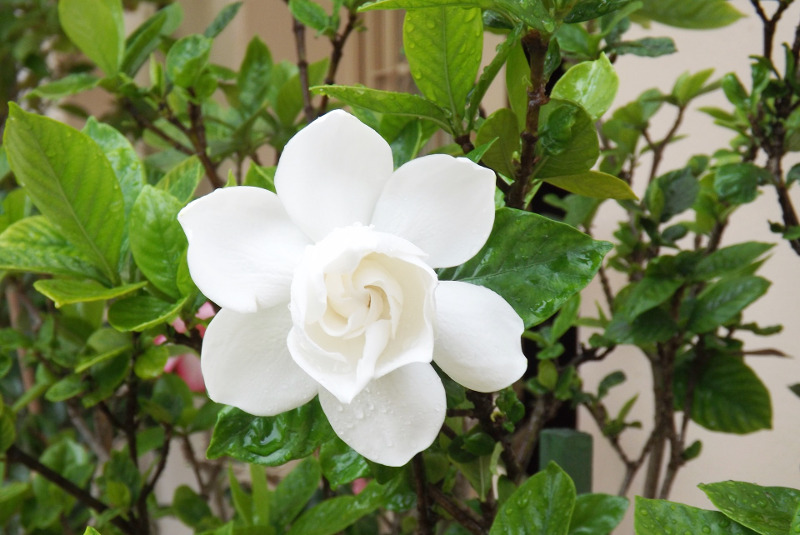Gardenias add beauty and fragrance to your yard and garden and can be grown in the ground and in containers. In most cases, the plants are considered non-toxic and not poisonous to humans according to the Nebraska Extension in Lancaster County. Specific types of gardenia can be considered toxic to dogs, cats and horses. However, in most cases the plants cause mild discomfort like diarrhea and hives.
This is true for all parts of the plant. The leaves, seeds, flowers and roots are all non-toxic and considered safe to humans. In fact Gardenias are considered an edible flower. Some people even make pickles out of the green flower buds. If you are concerned about a reaction after being in contact with a plant it is always best to consult your doctor or veterinarian.

Are Gardenias Poisonous to Children
Children can safely play around gardenia plants. However they should be supervised as the buds and blooms could pose a choking hazard for infants and toddlers. If you are concerned about a reaction after being around a certain plant type it is always best to consult your pediatrician.
Are Gardenias Poisonous to Dogs
According to the ASPCA (American Society for the Prevention of Cruelty to Animals), Gardenia jasminoides is considered toxic to dogs, cats and horses. The toxic components of geniposide & gardenoside are found in gardenia jasminoides. The plant is not typically deadly for animals if ingested, but can cause stomach discomfort, diarrhea or hives.
Other types of gardenia should be safe around those animals. Puppies and dogs love to dig and chew on branches and roots. Gardenias are safe and should not pose a problem if ingested for most types of gardenia.
However, if you witness a reaction such as vomiting, diarrhea, pain, difficulty breathing or any other warning sign, it is best to consult your veterinarian. Animals are like people and they too can be allergic to certain plant types.
Are Gardenias Poisonous to Cats
As mentioned above, most gardenias are safe for cats and kittens to play around and sleep near. Gardenia jasminoides is considered toxic to cats, but it is not often an issue. Most cats do not really take an interest in shrubs. If you do see your cat chewing or clawing on your gardenia bush, it may do more damage to the plant than your feline. However if you witness a reaction such as vomiting, diarrhea, pain, difficulty breathing or any other warning signs, it is best to consult your veterinarian. Animals are like people and they too can develop reactions to certain plant types.
Are Gardenias Poisonous to Other Animals
Gardenia jasminoides is considered toxic to horses and other livestock such as horses, pigs, goats, and chickens. But most gardenias are not poisonous to other animals. In fact many larger animals are not even attracted to this strong smelling shrub. Gardenias are deer resistant for this very reason.
Symptoms of Gardenia Poisoning
If you are growing Gardenia jasminoides and suspect plant poisoning, always check with your doctor or veterinarian for guidance. This can occur with any plant if too much of it has been ingested or if an adverse reaction is developed to the plant. Here are some common symptoms to look out for: Vomiting, Diarrhea, Nausea, Pain in abdomen, & Hives.
To prevent anything bad from happening in the first place, you can use physical barriers such as decorative fencing to prevent children or animals from getting too close for a taste. Dogs and cats can sometimes suffer from a nutrient deficiency if they continually gnaw on certain things so it might be time for a thorough check up from your vet to check on your pets health. There are also animal deterrent products on the market that can help prevent animals from chewing on plants.
Pet Poison Helpline
If something were to happen to your furry friend, and you suspect that they are suffering from (insert plant) poisoning, there is a poison control hotline to call for 24/7 vet advice. It is called the Pet Poison Hotline, and their phone number is (855) 764-7661.
Click here for a complete list of Pet Safe Plants.
Sources:
"Gardenia." American Society for the Prevention of Cruelty to Animals. aspca.org
"Gardenia." Louisiana State University. lsu.edu
"Toxicity of Common Houseplants." Nebraska Extension in Lancaster County. lancaster.unl.edu
 |
Author Janice Cox - Published 12-07-2021 |


